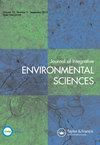气候变化对马来西亚粮食安全的影响:水稻产业的经济和政策调整
IF 3.5
4区 环境科学与生态学
Q3 ENVIRONMENTAL SCIENCES
Journal of Integrative Environmental Sciences
Pub Date : 2016-01-02
DOI:10.1080/1943815X.2015.1112292
引用次数: 49
摘要
与世界其他地区一样,马来西亚的稻田生产极易受到天气变化和干旱、洪水等极端条件的影响。这种情况迫使马来西亚对其稻米工业维持保护主义制度,以更好地确保该国的粮食安全。本研究采用作物模拟模型(DSSAT)和系统动力学方法,评估了气候变化对马来西亚未来水稻生产、水稻自给水平和农民总收入的影响。DSSAT模型的结果显示,到2030年,在主要生长期和非生长期,温度升高和降雨模式的变化可使水稻产量分别下降12%和31.3%。根据系统动力学的结果,水稻产量的减少预计会降低农民的总收入和该国的大米自给水平。该研究提出了两种不同的政策方案来克服这些不利影响。总体政策的含义是,如果政府不采取行动改变其现行政策,马来西亚大米产业将无法持续下去。本文章由计算机程序翻译,如有差异,请以英文原文为准。
Impact of climate change on food security in Malaysia: economic and policy adjustments for rice industry
Abstract Rice paddies production in Malaysia, as in other parts of the world, is extremely vulnerable to weather changes and extreme conditions such as drought and flooding. Such situations forced Malaysia to maintain a protectionist regime with respect to its rice industry to better ensure food security for the country. In this study, a crop simulation model (DSSAT) and system dynamics approach were used to assess the impact of climate change on future rice production, self-sufficiency level of rice, and farmers’ gross income in Malaysia. Results from the DSSAT model show that during the main and off growing seasons, increase in temperature and changes rainfall pattern can be expected to reduce the rice yield by 12 and 31.3%, respectively, until the year 2030. Based on the system dynamics’ results, the reduction in rice yield was expected to reduce farmers’ gross income and the rice self-sufficiency level of the country. The study suggested two different policy scenarios to overcome these adverse effects. The overall policy implication is that the Malaysian rice industry cannot be sustained if government takes no action to change its current policies.
求助全文
通过发布文献求助,成功后即可免费获取论文全文。
去求助
来源期刊

Journal of Integrative Environmental Sciences
ENVIRONMENTAL SCIENCES-
CiteScore
3.90
自引率
0.00%
发文量
13
审稿时长
>12 weeks
期刊介绍:
Journal of Integrative Environmental Sciences (JIES) provides a stimulating, informative and critical forum for intellectual debate on significant environmental issues. It brings together perspectives from a wide range of disciplines and methodologies in both the social and natural sciences in an effort to develop integrative knowledge about the processes responsible for environmental change. The Journal is especially concerned with the relationships between science, society and policy and one of its key aims is to advance understanding of the theory and practice of sustainable development.
 求助内容:
求助内容: 应助结果提醒方式:
应助结果提醒方式:


